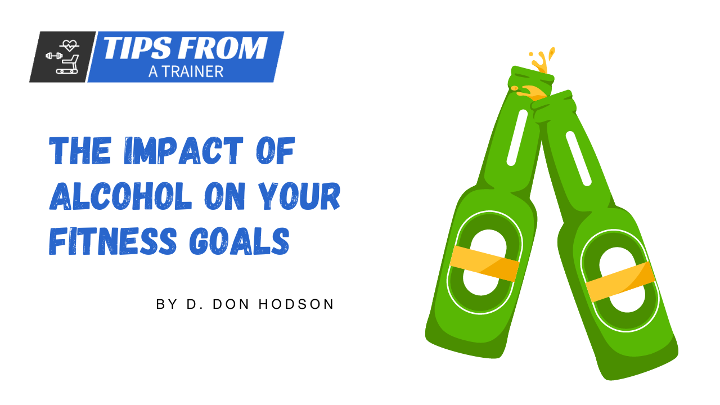Introduction
In today's society, alcohol consumption is a common social activity. Many people enjoy a drink or two during social gatherings, celebrations, or simply to unwind. However, if you are pursuing fitness goals, it's crucial to understand the impact of alcohol on your health and fitness journey.
In this article, we will explore in detail how alcohol affects various aspects of your fitness, including muscle growth, fat loss, performance, recovery, and overall well-being. By being aware of the effects of alcohol, you can make informed choices that align with your fitness goals.
Table of Contents
Introduction
Understanding Alcohol's Effects on Muscle Growth
Recovery and Sleep Quality
Mood Disturbances
Anxiety and Stress
Cognitive Impairment
Motivation and Commitment
Sleep Disturbances
Strategies for Performance and Longevity
Practice Moderation
Seek Healthier Coping Mechanisms
Prioritize Self-Care
Surround Yourself With Supportive Individuals
Stay Mindful and Reflective
Conclusion

Understanding Alcohol's Effects on Muscle Growth
When it comes to building muscle, alcohol consumption can have several adverse effects. Firstly, alcohol negatively impacts protein synthesis—the process responsible for muscle repair and growth. Studies have shown that alcohol consumption can interfere with protein synthesis, potentially hindering muscle recovery and growth. Additionally, alcohol consumption can affect hormone levels, such as testosterone and growth hormone, which play a crucial role in muscle development.
Long-term alcohol abuse can lead to decreased testosterone levels, affecting muscle-building potential. Understanding these effects can help you make conscious decisions regarding alcohol consumption to optimize your muscle-building efforts.
Alcohol's Influence on Fat Loss
If your fitness goals include fat loss, it's important to understand the implications of alcohol consumption. Alcohol is relatively high in calories, and excessive consumption can contribute to a caloric surplus, hindering your fat loss efforts. Moreover, alcohol can impact metabolism, temporarily reducing fat burning and nutrient partitioning. Regular alcohol consumption can also lead to poor dietary choices, as alcohol tends to lower inhibitions and increase cravings for unhealthy foods. Being aware of these effects can help you develop strategies to minimize the impact of alcohol on your fat loss goals.
Performance and Exercise Implications
Alcohol can have significant implications for exercise performance. Firstly, it can dehydrate the body, negatively affecting physical performance and endurance. It's essential to prioritize hydration and replenish fluids adequately when consuming alcohol. Additionally, alcohol impairs motor skills, balance, and coordination, increasing the risk of injuries during physical activity.
Engaging in workouts while under the influence of alcohol can compromise form, stability, and overall safety. Understanding these effects can help you make informed decisions about alcohol consumption in relation to your exercise routine.
Recovery and Sleep Quality
Quality sleep is vital for muscle recovery and overall well-being. Unfortunately, alcohol can disrupt sleep patterns and reduce sleep quality. While alcohol may initially make you feel sleepy, it can interfere with the deeper stages of sleep, affecting your body's ability to recover and repair. Poor sleep quality can also lead to increased fatigue and decreased exercise performance.
It's crucial to prioritize sleep hygiene and develop strategies to mitigate alcohol-induced sleep disturbances. Implementing these strategies can help you optimize recovery and achieve better fitness results.
Mental and Emotional Well-being
In addition to the physical implications, alcohol can significantly impact your mental and emotional well-being. While it may provide temporary relief or relaxation, excessive alcohol consumption can have long-lasting effects on your mental health and overall emotional balance. Understanding these effects can help you make more conscious decisions regarding alcohol consumption and prioritize your mental well-being alongside your fitness goals.
Mood Disturbances
Alcohol is a depressant that can alter neurotransmitter levels in the brain, leading to mood disturbances. While it may initially provide a sense of euphoria or relaxation, excessive alcohol consumption can result in feelings of sadness, irritability, and even depression. These mood swings can disrupt your emotional well-being and make it more challenging to maintain a positive mindset necessary for achieving your fitness goals.
Anxiety and Stress
While alcohol may temporarily alleviate stress and anxiety symptoms, it can actually exacerbate these conditions in the long run. Alcohol affects the balance of neurotransmitters like serotonin and gamma-aminobutyric acid (GABA), which play a crucial role in regulating mood and anxiety. Regular and excessive alcohol consumption can disrupt this delicate balance, leading to heightened anxiety levels and increased stress response.
Cognitive Impairment
Alcohol consumption affects cognitive function, including memory, attention, and decision-making abilities. Excessive drinking can impair your ability to concentrate and make sound judgments, hindering your progress in both fitness-related and everyday tasks. Additionally, alcohol can interfere with your ability to retain information, affecting your learning process and overall cognitive performance.
Motivation and Commitment
Staying motivated and committed to your fitness goals requires mental strength and determination. However, alcohol can dampen your motivation and weaken your commitment. Excessive drinking can lead to feelings of apathy, decreased self-discipline, and reduced drive to pursue your fitness goals. It becomes easier to succumb to temptations, skip workouts, or make unhealthy dietary choices when under the influence of alcohol.
Sleep Disturbances
As mentioned earlier, alcohol can disrupt sleep patterns, impacting the quality and duration of your restorative sleep. Poor sleep can leave you feeling fatigued, groggy, and less inclined to engage in physical activity or adhere to a healthy lifestyle. Furthermore, inadequate sleep can contribute to increased stress levels, impaired cognitive function, and decreased exercise performance, all of which can hinder your progress towards your fitness goals.
Strategies for Performance and Longevity
It is crucial to prioritize your mental and emotional well-being on your fitness journey. Here are some strategies to help mitigate the negative effects of alcohol on your mental health:
Practice Moderation
Opt for occasional and moderate alcohol consumption instead of excessive or binge drinking. Set limits for yourself and be mindful of your alcohol intake, allowing your body and mind to recover fully.
Seek Healthier Coping Mechanisms
Find alternative ways to manage stress and unwind that don't involve alcohol. Engage in activities such as exercise, meditation, deep breathing exercises, or spending time with loved ones that promote relaxation and emotional well-being.
Prioritize Self-Care
Take care of your mental health by incorporating self-care practices into your routine. This can include activities like journaling, practicing mindfulness, engaging in hobbies, or seeking professional support if needed.
Surround Yourself With Supportive Individuals
Build a strong support system of like-minded individuals who understand and respect your fitness goals. Surrounding yourself with positive influences can help you stay motivated and provide the necessary emotional support on your journey.
Conclusion
Regularly assess how alcohol consumption affects your mental and emotional well-being. Pay attention to how you feel after consuming alcohol and reflect on whether it aligns with your fitness goals and overall mental health. Being mindful allows you to make conscious choices that prioritize your well-being.
Remember, your mental and emotional health are integral to your overall fitness journey. By being aware of the impact of alcohol on your mental well-being and implementing strategies to mitigate its negative effects, you can continue working towards your fitness goals while maintaining a positive state of mind.

Don Hodson, Certified Personal Trainer
I'm Don, an ACE-certified personal trainer and the founder of Tips From A Trainer. With my passion for fitness and years of experience, I've helped countless individuals transform their physiques!
Having personally overcome weight challenges throughout my life, I understand the struggle. Through consistency, exercise, and a balanced diet, I have managed to stay in shape and I want to share my message with the world!
The fitness industry is fraught with misconceptions and deceptive practices, which is why I am committed to providing you with the truth.
- My Site: www.Don-Hodson.com
- My Company: www.ConnectedAgeMarketing.com

The Impact of Alcohol on Your Fitness Goals